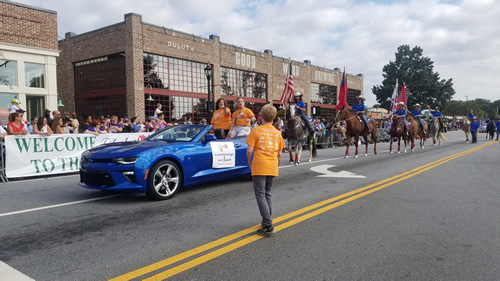 |
The City of Duluth, Georgia
The year was 1821. The man’s name was Evan Howell. With his family, he came from North Carolina to the newly created Gwinnett County. He built a home and settled in the fertile bottom lands of the Chattahoochee River, an area previously inhabited by the Creek and Cherokee Indians. Mr. Howell constructed his first home on the site of the present residence of Mr. and Mrs. Scott Hudgens. Like Howell, other pioneers began to flow into Gwinnett, and Indian Woodlands began to grow populated with crude cabins and rich farms. In 1833 Howell applied for permission to the Interior Court to construct a road across his land from the Chattahoochee River. The Court agreed with Howell that such a road would “promote the public good by affording additional facilities to travelers, passengers, and others.” The new road joined the road from Lawrenceville. The residents christened the intersection Howell’s Cross Roads. The name stuck for several decades until 1871 when the railroad came to town. After the railroad was completed, the residents invited Evan Howell, a grandson of the early settler, to dedicate the new train depot and name the new town. At this time, Duluth, Minnesota was publicly humiliated by a U. S. Representative’s speech concerning the railroad. Reasoning that healthy publicity couldn’t hurt, Howell decided to take advantage of the situation, and so Howell’s Cross Roads was given the name Duluth. Around the turn of the Century, Duluth had farmers coming from surrounding counties to have their cotton harvests ginned and shipped. During those days the streets of downtown Duluth were so covered with bales of cotton overflowing from the warehouses that the main streets were virtually impassable. While they were in the town, families stocked up on store bought goods and supplies from local merchants. At one time, Duluth could boast of three cotton gins, 10 cotton buyers, several warehouses, three mule trading barns, and three blacksmith shops. While much of the small-town character of this old cotton city remains, the hand of progress has led Duluth boldly and swiftly into the present. There is a lot of talk about the old days, and nostalgia runs deep as the Chattahoochee River. “Pride in Old and New” is not a motto the citizens of Duluth take lightly. Everyone here takes pride in what the community was, what it is today, and what it will be in the future. Duluth is a progressive City with its sights set firmly on the future, but a City with a promise to keep its “Old Town Pride.” For more information about the City of Duluth and their current happenings, please visit their website at: http://www.duluthga.net | Important Dates in the History of the City of Duluth
 |
Duluth Historical Society is a non-profit 501 c3 organization. All donations are tax deductible.